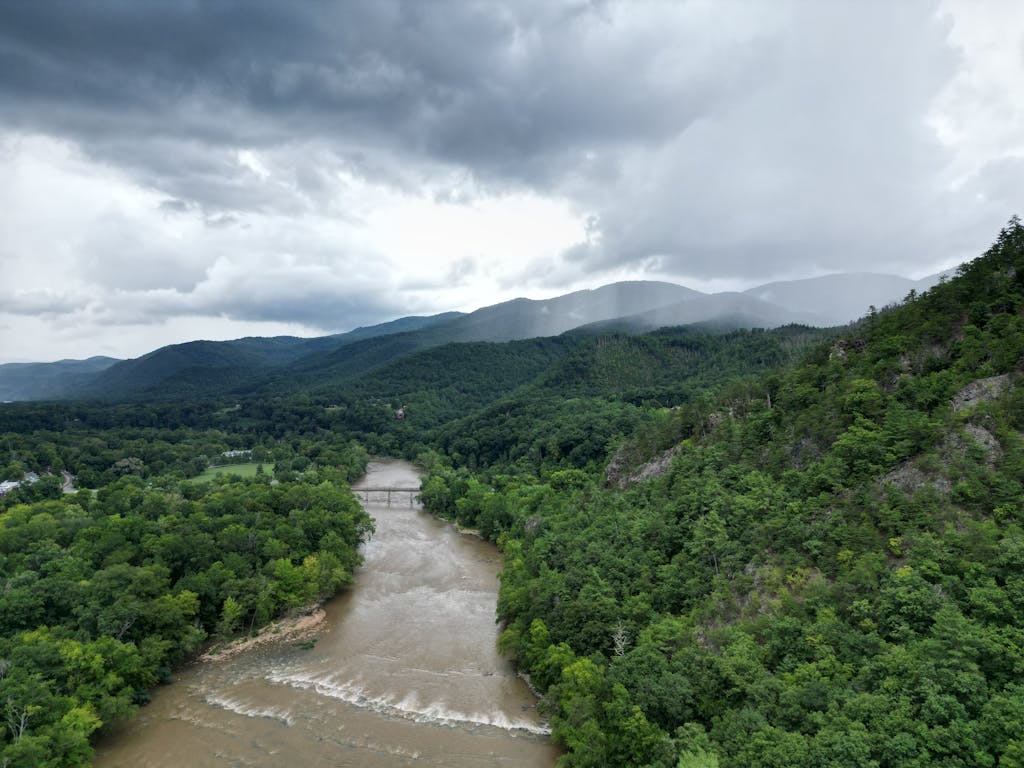
By Rev. Erin Burleson
On September 27, 2024, I took my children outside into the hurricane winds and rain.
It wasn’t reckless—it was a teaching moment. I wanted them to know what it means to face a storm without fear, to see that while nature is powerful and unpredictable, it is also something to respect, embrace, and learn from. I thought a walk through the weather might calm the inner storms swirling in their 9- and 4-year-old minds.
What I didn’t expect was that we’d be trapped in our neighborhood for three days.
The French Broad River rose more than 10 feet in just 24 hours, cutting us off from roads, stores, and communication. Each day we’d walk to the edge of the water, talk with neighbors, and wait for the waters to recede. That ritual—of checking the levels, gathering each evening, trading laughter and updates—became a practice that held us. It grounded us in presence and patience. In the rhythms of waiting, we were sustained.
Five days after the storm, we made our way to our local church. We opened the doors and quickly became a distribution hub. That sacred space—our place of worship—was transformed into a place of tangible grace. Diapers, hygiene kits, meals, and supplies filled the sanctuary. Yet the sacred remained. We lit candles. We held silence. We made room for neighbors and strangers alike. The goal was never just relief—it was dignity, mutuality, and peace.
And somewhere in that whirlwind, I discovered something surprising about myself.
I’ve lived with anxiety for much of my life and was diagnosed with ADHD just last year. But during those first three months of crisis response, my anxiety was almost nonexistent. The fast pace, the constant decision-making, the high-level stimulation—it was as if my brain clicked into place. I discovered that functional creativity—quick, responsive, purposeful—was a kind of clarity I hadn’t known I needed. It taught me more than months of therapy.
But crisis mode isn’t sustainable. It drains the body, even if it sparks the mind.
So when a new opportunity with Faith 360 Network came unexpectedly into my life, I wrestled with it. I didn’t need a new job. I certainly wasn’t seeking one. And our church was still in the thick of recovery work and launching our Covenant Community RV Village to temporarily house families displaced by the storm (learn more here).
But through prayer, discernment, and many late-night conversations, I began to realize: this story wasn’t about leaving something behind—it was about stepping more fully into who I am.
What I’ve learned is this: routine and ritual can be lifelines in disorienting times. The rhythms of opening and closing the church, of lighting candles and making daily decisions, became acts of grounding and grace. They helped me not just survive post-disaster life—but begin to thrive in it.
When my body wanted to stabilize and hold on to what was, my mind—and God—invited me to shift. And shifting, I’ve learned, can be holier than staying still.
My hope and prayer for pastors, leaders, congregations, and communities is this: let us pay attention to our minds as much as our bodies. Let us not ignore the foundational spiritual skills of breath, attentiveness, and mindfulness. Let us remember that the first gift God gave humanity was breath—the very Spirit of life. That the God we serve is a God of peace. And as Scripture promises, “May the God of hope fill you with all joy and peace as you trust in Him” (Romans 15:13).
In times of storm and seasons of shift, may we lean into routines that ground us, rituals that renew us, and the Spirit who sustains us. There is grace enough for this day, and strength enough for what comes next.
About the Author

Erin Burleson is a United Methodist pastor at Covenant Community Church in Asheville and Program Director for Faith360, an initiative of ABCCM. She brings over 20 years of ministry experience and a passion for community and faith development. Erin is a wife of 24 years and mother of two.

